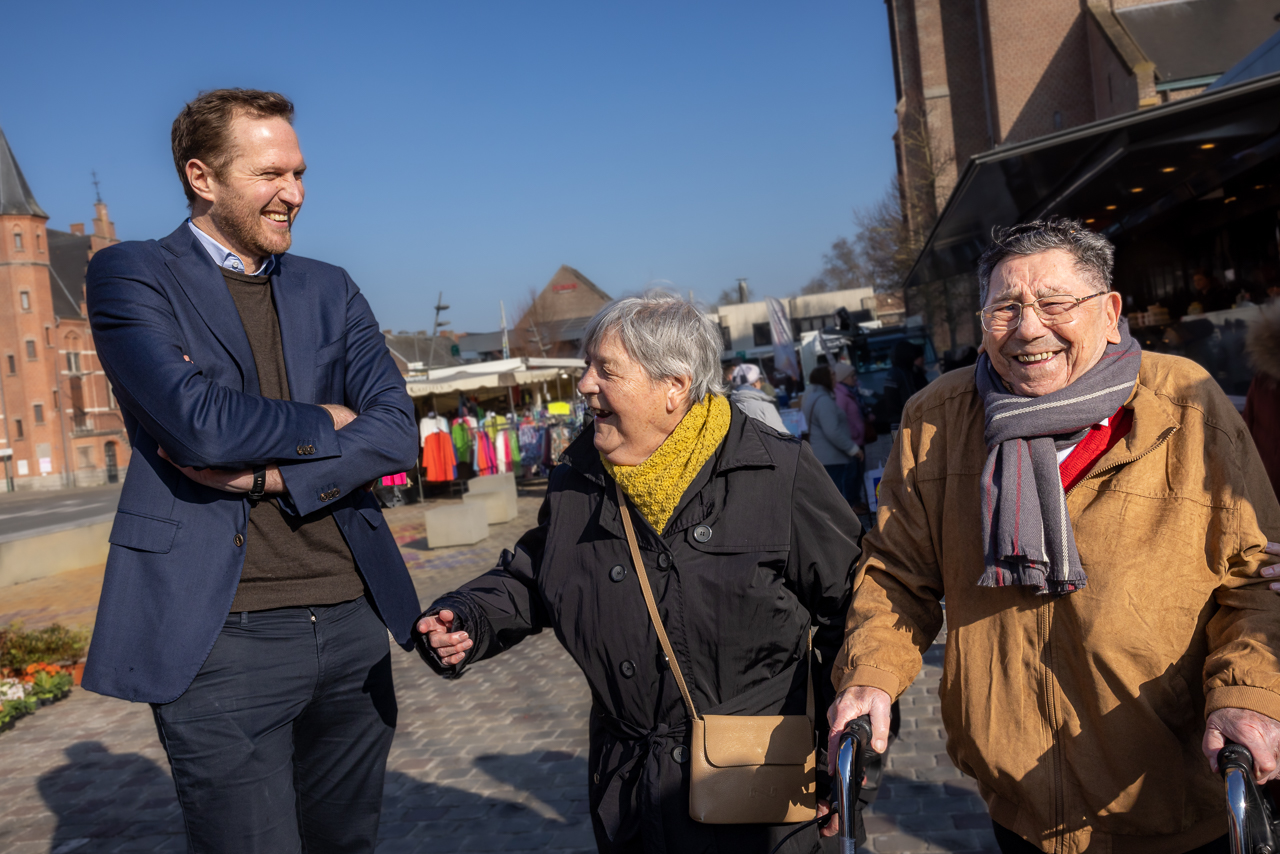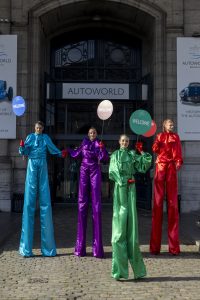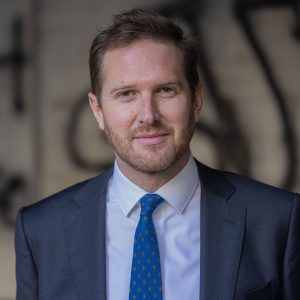Brieuc Van Damme took over from Luc Tayart de Borms as CEO of the King Baudouin Foundation in May last year.
What motivates him, how will he build on his illustrious predecessor’s legacy and in which direction would he like to steer the KBF during his time in post?
Alliance Features Editor Andrew Milner caught up with Van Damme around their Be Philanthropy event in Brussels in April.
Andrew Milner: Your background is as an economist and policy advisor and you’ve got a lot of public sector experience. What attracted you to the King Baudouin Foundation job?
Brieuc Van Damme: Before I joined the Foundation, I was running the Belgian healthcare insurance, which is the second biggest public budget in Belgium. What you’re able to implement there affects 11 million patients, health professionals and citizens. Working in the public sector has many advantages, but flexibility, entrepreneurship is not one of them. Impact doesn’t only have to do with quantity, but also with autonomy. I got to know the King Baudouin Foundation in 2011, when I co-founded the Friday Group, a think-tank for young people funded by KBF. I thought they would be a better match to turn all the creativity and entrepreneurship I have into something that serves the public good, a place where you have more flexibility, freedom and agency.
What do you think is the most valuable asset you bring to the foundation?
Maybe the fact that I have a real technical understanding of how policy and politics works on the one hand and have a lot of ideas and experience with managing complex organisations on the other. And, really just by sheer luck, I can bring people together – a skill I learned in policy-making, however paradoxical that may seem, and also from my background. My mum is French-speaking, my dad is Dutch-speaking, I grew up in Africa. My wife is Norwegian-American. So I’ve always been surrounded by people with different sensibilities, different points of view. So, while being faithful to your beliefs, you develop the empathy to try to understand other points of view, although you don’t share them. I think there’s not enough of that in today’s polarised societies, and maybe that’s something I can bring to the table.
How important is your dual background in the Belgian context given the separatist tendencies there are in the country?
It’s key. If we stop talking to each other, it’s impossible to come to good policy and good societal directions. In Belgium, there are three communities, and the two bigger ones have grown apart. I think it’s the same in many other countries. It’s not only about culture and language, it’s also about left and right, urban versus rural. I think there are fewer and fewer places where everyone can feel safe to express his or her opinions and that are trusted to be independent and to bring people together in order to progress together. That is more important than ever in our complex societies where larger and larger groups feel left out and react in harsher ways. The Foundation, and foundations in general, have a very important role to play to be bridge-builders and safe havens for different opinions.

Brieuc Van Damme at a retirement home in Merelbeke, Belgium in March 2023. The home runs innovative programmes supported by KBF. Photo credit: Frank Toussaint.
Obviously, Luc Tayart leaves a giant footprint as head of KBF, but also as a central figure in European philanthropy. How daunting is it to come in and replace him and what’s been the hardest part of it?
Luc is a man with a very clear vision. He and Dominique Allard made it the most important foundation in Belgium, a key player in Europe, a thought leader, and hence also a very complex organisation with many stakeholders. I have a great deal of respect for that. I also have experience with organisations and with bringing together different interests. I’m confident that with the team we have, which has a lot of experience and a great deal of talent, we can prepare the King Baudouin Foundation for the second half of its first century of existence.
What things do you think will change and what do you think will stay the same under your tenure?
Organisational culture is the secret sauce that can make an organisation outperform others, or just be excellent in what it does. That was and will continue to be the ambition for the Foundation. I don’t know what all the ingredients are, but one of them is a capacity to listen. Another is a very entrepreneurial way of looking at philanthropy and social innovation. It is a very flexible and creative way of trying to find solutions. And it is excellence. All these ingredients, of course, I want to keep. But even ketchup changed its recipe to include less sugar and less salt. A secret sauce, too, can change over time. We’ve grown tremendously, and that growth is going to continue in the years to come. Up to now, the Foundation has been organised like a scale-up and we have to keep that company culture of being agile, entrepreneurial, with little hierarchy. But in order to integrate and grow efficiently, to have as much societal impact with as little overhead as possible, we need to organise ourselves a bit more. That’s the spice I’d like to add to the sauce. That means investing in digitisation, making the experience, for example, of grantees and philanthropists better. We’ll also have to think about governance. We now have 1,300 Funds that we manage. It’s going to be impossible for the steering committees to oversee all of those so that has implications for governance and for internal processes. Those are elements I want to add.
Another comes from the fact that the latest strategic vision dates from January 2020 and the world has changed tremendously since then – there was the pandemic, the war in Ukraine, Black Lives Matter. The societal issues highlighted by Black Lives Matter have never been higher on the political agenda. Young people are mobilising because they are afraid that their future will be damaged because of climate change. Democracy is on the defensive. So we need to rethink our strategic vision, and that’s an exercise that is underway.
If we stop talking to each other, it’s impossible to come to good policy and good societal directions.
Two things we’re focussing on – we have to leverage our climate programme, make it more appealing to younger generations and more appealing for philanthropists. The second is democracy and what I call public conversation. I feel that we have unlearned how to talk to each other in a constructive way that leads to the best possible policy decisions. It’s true, especially in Belgium, but also in many other countries. How do we reinvent the way we talk to each other? How do we make sure that people have more empathy for each other’s point of view? That’s something we have always worked on, but we need to put that more at the forefront of our work and come up with solutions to help more institutional players make sure we’re able to talk to each other in five or ten years from now. I was shocked by a study I saw from the World Economic Forum that said that in the US, more than 70 per cent of people would not help somebody in need if they knew they were from the other side of the political spectrum. When did disagreeing make us not want to help each other? I think it’s our responsibility to make sure we don’t get there. It worries me that whenever somebody expresses an idea or an opinion, it’s either perfect for one side or incredibly stupid for the other side. There’s little capacity left to try to understand where that idea and that sensibility comes from, and if that continues it’s the end of society as we know it, in my opinion.
Read more: Europe’s philanthropy man: speaking with Luc Tayart de Borms
You’ve got eight areas of work at the foundation. Do you see these two, climate change and democracy as getting special emphasis over the coming few years?
We have to listen to funders and grantees first and foremost. But, with our own money, we can move some issues up the agenda and personally, I think the two that deserve more attention would be climate change and democracy. Of course, my board and my colleagues will need to agree.
You mentioned the King Baudouin Foundation endowment, your own money as you say, and of the other funds within the foundation. How influential are they in determining the direction the foundation takes?

At KBF’s Be Philanthropy 20203 gathering in Brussels in April, which involved over 1,100 actors in European philanthropy. Photo credit: J. Van de Vel.
They are key. I don’t think we can do our job properly if we think we have all the answers and solutions in Brussels. One of the things I repeat when I talk to my colleagues is that we need to have both feet in the mud. When philanthropists and donors come in with their own stories, with their own sensibilities, we learn a lot. The magic happens when all these different points of view come together and you discover things you would never have thought of from your own experience. They are key in driving that innovation agenda forward.
I saw an article that was published on the foundation’s website when you took over the post, and you talked about helping the most vulnerable and acting as a social innovations lab. What kind of social innovations do you foresee and will the most vulnerable become the main focus for the King Baudouin Foundation in the future?
There’s one very interesting project that we have with a consortium of other foundations, Fair Energy Transition for All [FETA]. It was inspired by what happened in France with the Gilets Jaunes protest, when a well-meant policy measure to start the transition to a more sustainable energy mix was met with huge resistance. It’s not enough to say we’re going to involve citizens in decision-making. A lesson we’ve learned from FETA is that we need to put in extra work and energy and it’s very difficult to gain the trust of people who feel left behind. With FETA, we’ve had citizen panels reaching out to the most vulnerable in our societies in order to have a better understanding of what their priorities are, what their do’s and don’ts are, what is important in their being a constructive actor in that energy transition, within nine countries and also at European level. We presented policy recommendations to governments and our findings at the COP in Sharm El Sheikh in November. They show that there is a real need for new models of active listening and translating that into policy.
Another thing is how do we make sure that as foundations, as philanthropists, we complement public policy instead of trying to copy public authorities? There’s been a lot of talk about social impact bonds. From what I have seen, these social impact bond contracts are very haute couture. It’s great to seek perfection, but maybe we could do with a little less of that fine-tuning and try to industrialise those processes more. If we can do that, I think we will be better able to help leverage private money for public means.
What role does the King Baudouin Foundation play in the consortium behind the FETA project?
We put that consortium together with the European Policy Centre and other European foundations. That’s the beautiful thing about the philanthropic world – we’re allies not rivals. I think an important source of innovation is copying what works in other countries and adapting to the local context.
Just to talk about risk, it’s a truism to say that philanthropy is the risk capital of social innovation, but a lot of foundations shy away from it in spite of that. Do you think they need to go further, and in what ways?
It’s not for me to give lessons to other foundations. I know that risk-taking has been in the King Baudouin Foundation’s DNA, and it’s something I want to continue, but maybe put even more focus on our failures because that’s how we learn. I learn more from a slap in the face than a pat on the back. So, at KBF, we need to stick our neck out more. When people ask me what the Foundation is, the analogy I start with is the Starship Enterprise: we go and look for lost causes and forgotten people like the Starship Enterprise in the Star Trek universe – we want to go where no one has gone before.
I would like KBF to have helped in contributing to depolarising today’s public conversation.
You mention failure and that’s the other side of risk. I know that King Baudouin Foundation’s got this best failure award. Are you going to extend that culture of learning from failure?
We used to have that, but it never really took off. The award made it seem almost as if failure was exceptional. Instead, we have to make it part of our day-to-day lives. We operate in a complex, very sensitive environment where it would be weird not to fail.
Philanthropy has an important role to play, but in terms of money and influence, it’s minor. Where should its efforts really lie?
I think testing new models with high risk, but potentially high reward, and then having the skill to convince people of why to continue and potentially scale some of the lessons. Philanthropy has many faces. You can go to the most geo-strategic level, such as the FETA project which is trying to convince European policy-makers to change the way they make policy. But it’s also about very small things which are equally impactful on a completely different level. I like this example: in 1996, we were given an island in a river in the south of Belgium, and the only thing we do is put six sheep on the island every summer to preserve its typical character and we organise a barbecue with all the people from the village, teaching kids about the fragility and conservation of the beautiful nature that surrounds them, bringing a community together. You’re never going to read about that in the Financial Times but for that small community, it is super-important and everybody looks forward to that day. We try to make the synthesis of the global geo-strategic and the super-local which, for the people involved, is equally important. It’s not for us to judge where we should put our priorities in that regard.
You talked earlier about philanthropy complementing policy. Are there times when you need to be counterintuitive, as you put it in the article I mentioned earlier, where you need to go against what’s happening? How do you find the balance there?
Trial and error often. Building on previous experiences. And it’s a delicate balance, indeed, between being edgy enough on the one hand, and consensual enough, on the other. I’m sure we’ve failed on that as well. The King Baudouin Foundation has always been outspokenly pro-European. At some point, in Belgium, that may not have been seen as a political point of view. I can assure you, it is very much so now. So daring to stick your neck out on some issues, but also making sure that you’re still able to make and find consensus with the people that disagree with you. There again, we go back to active listening.
Your predecessor played a huge role in European philanthropy as distinct from Belgian philanthropy – insofar as it’s possible to make a distinction – do you expect to be playing a similarly central role in European philanthropy?
I hope so. We want to build not just a European but a global philanthropic infrastructure and network. It’s something we have to do with partners. I hope we can fight together for an integrated philanthropic market in Europe, so that we facilitate funnelling private funds to public interests.
If you were to choose one thing that you would you like to achieve during your time at KBF, what would it be?
Ten years from now I’ll be 50. That’s a good age to leave. Any organisation needs to have new blood. If we were able to contribute even modestly to building that global philanthropic infrastructure, I would be proud. Second, I would like KBF to have helped in contributing to depolarising today’s public conversation. And of course, if we can transform the means that come to the Foundation into more impact and more effective social innovation, we will have successfully contributed to fulfilling our mission.
Andrew Milner is Features Editor at Alliance magazine.




Comments (0)